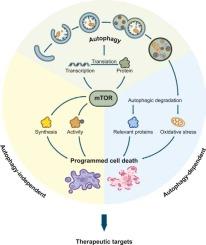mTOR in programmed cell death and its therapeutic implications |
| |
| Affiliation: | Department of Critical Care Medicine, Peking Union Medical College Hospital, Chinese Academy of Medical Science and Peking Union Medical College, Beijing, China |
| |
| Abstract: | 
Mechanistic target of rapamycin (mTOR), a highly conserved serine/threonine kinase, is involved in cellular metabolism, protein synthesis, and cell death. Programmed cell death (PCD) assists in eliminating aging, damaged, or neoplastic cells, and is indispensable for sustaining normal growth, fighting pathogenic microorganisms, and maintaining body homeostasis. mTOR has crucial functions in the intricate signaling pathway network of multiple forms of PCD. mTOR can inhibit autophagy, which is part of PCD regulation. Cell survival is affected by mTOR through autophagy to control reactive oxygen species production and the degradation of pertinent proteins. Additionally, mTOR can regulate PCD in an autophagy-independent manner by affecting the expression levels of related genes and phosphorylating proteins. Therefore, mTOR acts through both autophagy-dependent and -independent pathways to regulate PCD. It is conceivable that mTOR exerts bidirectional regulation of PCD, such as ferroptosis, according to the complexity of signaling pathway networks, but the underlying mechanisms have not been fully explained. This review summarizes the recent advances in understanding mTOR-mediated regulatory mechanisms in PCD. Rigorous investigations into PCD-related signaling pathways have provided prospective therapeutic targets that may be clinically beneficial for treating various diseases. |
| |
| Keywords: | mTOR Autophagy Apoptosis Necroptosis Pyroptosis Ferroptosis |
| 本文献已被 ScienceDirect 等数据库收录! |
|

